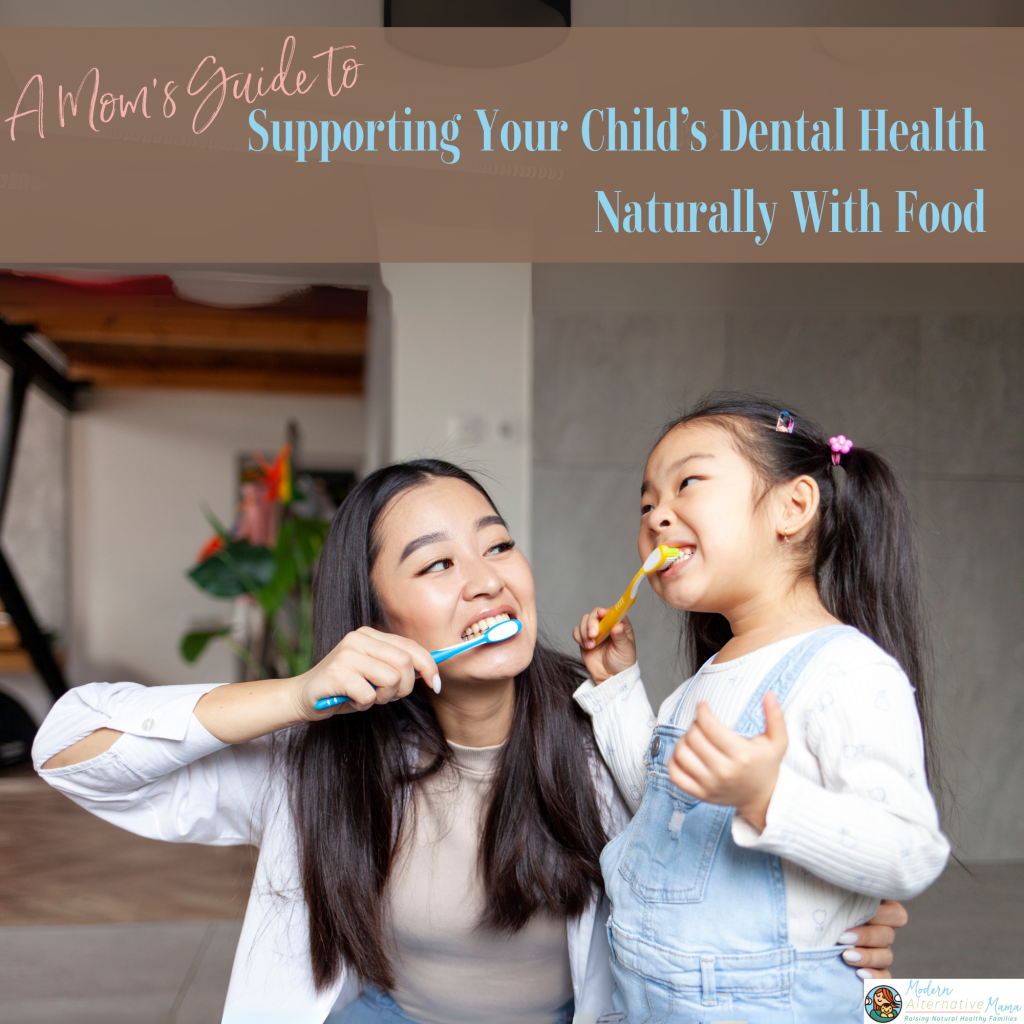Hey Mama, I know how much we all worry about our kids’ teeth and their health, and I’m sure you’ve heard about cavities and how tough they can be to fix. Perhaps you are finding this blog after you read our blog titled “Navigating Your Child’s Dental Health: What Every Parent Needs to Know About Fillings.” But here’s something that may surprise you—certain foods can help your little one’s teeth actually heal. Yes, you read that right. By focusing on the right nutrients, we can support the natural remineralization process of their teeth and potentially reverse early-stage cavities. How awesome is that?
I’ve learned a lot about how food can help heal cavities from researching experts like Dr. Mark Burhenne, a dentist specializing in natural cavity healing, and Dr. Weston A. Price, who dedicated his life to researching nutrition’s impact on health. I’m so excited to share this knowledge with you because, as busy moms, we all want the best for our kids—and that includes their dental health!
So let’s dive into which foods you should include in your child’s diet to help heal cavities and which foods to avoid.
Foods That Can Heal Cavities
1. Calcium-Rich Foods
Calcium is essential for building and repairing strong tooth structure. It supports remineralization, which is the process that helps heal cavities. If your child can tolerate dairy, opt for raw, grass-fed dairy like milk, cheese, and yogurt. These are rich in calcium and other minerals that support teeth. If dairy isn’t an option, go for leafy greens like spinach, kale, and broccoli. Sardines (with bones), salmon, and fortified plant-based milks (almond, coconut) are other great sources.
Foods rich in calcium include:
- Canned sardines and salmon (with bones- best to get wild caught and in water)
- Leafy greens (spinach, kale, collard greens, bok choy)
- Broccoli
- Almonds
- Seeds (like sesame or chia)
- Figs (best to add these into a smoothie as they are very sticky on teeth)
2. Vitamin D
Vitamin D is crucial for helping your body absorb calcium and phosphorus, both of which are needed for strong teeth. You can get Vitamin D from egg yolks, fatty fish (salmon, mackerel, sardines), mushrooms, and even from sunlight exposure. In addition to these food sources, if needed, consider a Vitamin D supplement to ensure adequate intake.
Foods high in Vitamin D include:
- Egg yolks
- Fatty fish (like salmon, mackerel, sardines, herring)
- Mushrooms (especially shiitake and maitake)
- Cod liver oil
- Beef liver
3. Magnesium
Magnesium helps balance calcium and supports remineralization by ensuring that calcium can be effectively used by the body. You can boost magnesium levels by adding more foods like avocados, dark chocolate, leafy greens, pumpkin seeds, and almonds to their diet.
Other magnesium-rich foods include:
- Avocado
- Dark chocolate
- Pumpkin seeds
- Almonds
- Leafy greens (spinach, Swiss chard)
- Cacao (raw chocolate)
4. Vitamin K2
Vitamin K2 plays a huge role in calcium metabolism—it ensures calcium gets to where it needs to be, like in the bones and teeth, instead of accumulating in places it shouldn’t (like arteries). Vitamin K2 works best when paired with Vitamin D. You’ll find this vitamin in egg yolks, fermented foods, and grass-fed meats. Dr. Price famously called Vitamin K2 “Activator X” for its ability to promote healthy teeth, bones, and even support healthy aging.
Foods rich in Vitamin K2 include:
- Egg yolks
- Fermented foods (like sauerkraut, natto, and kefir)
- Grass-fed meats and organ meats (liver, heart)
- Full-fat dairy (especially from grass-fed cows)
- Grass-fed butter
5. Herbal Teas for Healthy Teeth
Herbal teas can also support dental health. Clove tea has antibacterial properties, and stinging nettle tea is high in minerals like magnesium and calcium that nourish teeth and bones.
Foods to Avoid (or Limit)
Just as certain foods can support healing, others can prevent it or make tooth decay worse. Here are the foods to avoid:
1. Sugar and Sugary Drinks
Sugar feeds harmful bacteria in the mouth, causing tooth decay. This is a big one! Cut down on sugary snacks like candies, cookies, and sodas, as well as fruit juices (which are high in sugar) and sugary sports drinks. Even fruit juices can contribute to tooth decay due to their high sugar content and acidity.
2. Dried Fruit
While dried fruit is often marketed as healthy, it’s loaded with sugar and is super sticky. Raisins, dried cranberries, and other dried fruits can get stuck in the crevices of your child’s teeth, providing a perfect breeding ground for bacteria.
3. Phytic Acid-Rich Foods
Here’s where it gets a little tricky, but it’s super important. Phytic acid is an “anti-nutrient” found in plant-based foods like grains, nuts, seeds, and legumes. While these foods have lots of health benefits, phytic acid can bind to minerals like calcium and magnesium, preventing your body from absorbing them properly. This is a big deal when it comes to healing teeth, because these minerals are essential for remineralization.
Foods high in phytic acid include:
- Grains (like oats, wheat, rice)
- Nuts and seeds (like almonds, peanuts, sunflower seeds)
- Legumes (like beans, lentils, chickpeas)
- Potatoes and beets (though in moderation, these can still be part of a healthy diet)
The good news is you can reduce the phytic acid in foods by soaking, sprouting, or fermenting them.
For example:
- Soak oats overnight to reduce phytic acid.
- Soak nuts and seeds for 12-24 hours before eating or cooking them.
- Choose sourdough bread, which is made from fermented grains, reducing the phytic acid content by around 60%.
4. Acidic Foods and Drinks
Acidic foods and beverages (like citrus fruits, soda, and energy drinks) can erode tooth enamel over time. While they’re okay in moderation, try to rinse your child’s mouth with water after consuming them to help protect their teeth.
The Role of Animal Proteins and Organ Meats
Here’s where I have to share a little something that’s been a game-changer in many families’ journey to better dental health—organ meats. I know this might not be everyone’s go-to food, but beef liver and other organ meats are incredibly nutrient-dense. These meats are full of vitamins and minerals, especially fat-soluble vitamins like A, D, and K2, which are essential for healthy teeth and bones. If your child can tolerate it, organ meats are a powerhouse when it comes to supporting dental health. You may have to sneak it in mixed with other meats or in a supplement. Remember to get grass fed and organic is possible.
Other nutrient-dense animal-based foods include:
- Bone broth (rich in collagen and minerals)
- Grass-fed butter and cheese
- Grass-fed meats (beef, lamb, chicken)
- Cod liver oil (packed with Vitamin A, Vitamin D, and Omega-3s)
Vegan Families and Their Kids’ Dental Health
I know some of you might be raising your kids on a vegan diet (or have been vegan during pregnancy), and here’s something I’ve noticed in my community: Some vegan families are raising children with perfectly healthy teeth, while others have noticed tooth decay issues.
Here’s what I’ve learned: It seems like the ability to maintain healthy teeth on a plant-based diet may depend on various factors, including the nutrients the mom received during pregnancy and the overall nutrient density of the child’s diet post-birth. Some kids seem to thrive on plant-based diets with minimal or even no dental issues, while others experience cavities and decay, even when their parents were vegan during pregnancy.
In some cases, families have seen positive changes by gradually incorporating nutrient-dense animal products like grass-fed meats, dairy, and organ meats into their kids’ diets. The addition of these nutrient-rich foods has been associated with slowing down or even reversing decay. It’s fascinating to see how genetics, diet, and lifestyle come into play.
If You’re Pregnant, It’s Never Too Early to Support Your Baby’s Dental Health
If you’re reading this during pregnancy, here’s an important tip: what you’re eating right now has a direct impact on your baby’s dental health. Studies show that the nutrients you consume while pregnant can influence the development of your baby’s teeth. Ensuring that you’re getting adequate calcium, magnesium, vitamin D, vitamin K2, and fat-soluble vitamins (A, D, E, K) will help set the foundation for your baby’s teeth to develop strong and healthy. This means that by nourishing your body during pregnancy with the right foods, you can decrease the likelihood of your baby having dental issues later in life.
Final Thoughts
Healing cavities is all about giving your body the right nutrients to support remineralization. Foods rich in calcium, magnesium, Vitamin D, Vitamin K2, and fat-soluble vitamins are key. On the flip side, reducing sugar, phytic acid, and acidic foods can make a huge difference in preventing further damage.
By focusing on a nutrient-dense diet full of these healing foods, you can help support your child’s dental health and even prevent or reverse early-stage cavities. And if you’re pregnant, don’t forget that what you eat now will lay the groundwork for your baby’s healthy teeth in the future.
It’s all about nourishing your family from the inside out. I truly believe this is the way to raise healthy, strong teeth for your kids—without relying on a lifetime of fillings and fluoride treatments. I hope this helps you navigate dental health and makes it a little easier for you!






